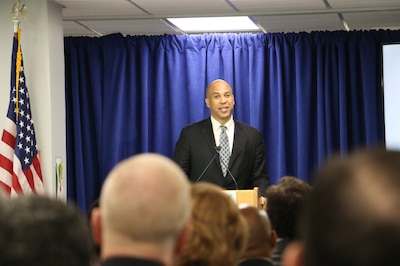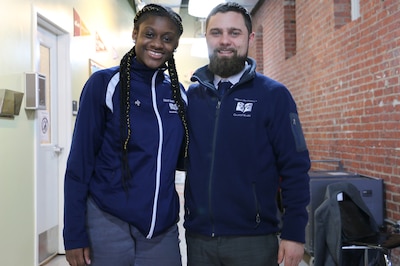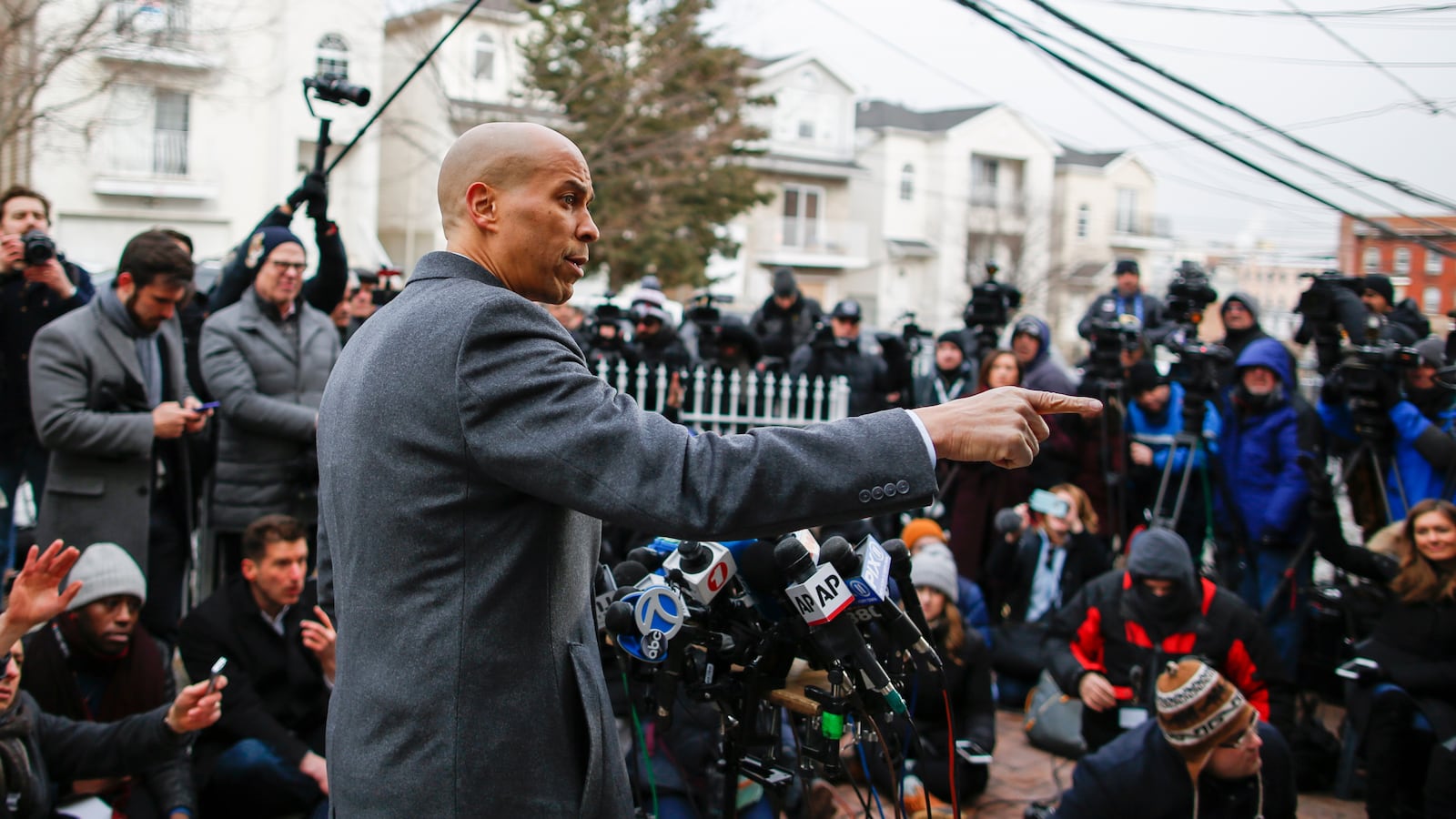Two decades ago, when Cory Booker was first entering politics in Newark, New Jersey, just 1 percent of the city’s students attended charter schools. Today, more than 30 percent do.
Along the way, Booker has been one of the biggest boosters of Newark’s charter schools, which are publicly funded but privately run. Booker, the U.S. senator and former Newark mayor who is running for president, has long spoken in moral tones about the right of poor families to reject struggling schools in favor of higher-quality options — whether run by districts or private operators. School choice, he has said, “liberated” some city students from “the imprisonment of institutions of failure.”
One beneficiary of his vigorous support has been Great Oaks Legacy, a charter network with a high school around the corner from Booker’s home in Newark’s once-blighted Central Ward, where he kicked off his presidential campaign last week.
As mayor, Booker helped bring to life a new downtown complex that featured affordable housing for teachers and space for three charter schools, including Great Oaks. As the charter staffed up, Booker would occasionally call a list of recruits provided by the principal and make a pitch for teaching in Newark. Other times, the celebrity mayor would share an evening of bowling and pizza with the schools’ Americorps tutors on his way home from City Hall.
“It was always cool if Cory Booker was on CNN the day before then came and hung out with us,” said Jared Taillefer, the network’s founding principal and now CEO, adding that Booker had a strong desire to get students into high-performing schools — a goal that could sometimes be achieved more quickly by backing new charters than tackling the slow, messy work of revamping district-run schools.
“If we’re going to sit and wait for the whole ship to turn around,” Taillefer said, “it just wasn’t going to work for kids.”
Yet Booker did eventually try to redirect the ship, famously raising $200 million in private donations to fund sweeping educational changes in Newark, including a new teachers contract, school closures, and new charter schools. Years later, many district schools continue to struggle with chronic absenteeism and low test scores, despite some improvements spurred by the reforms.
Meanwhile, the city’s charter sector, which vastly outperforms the district on state exams, more than tripled in enrollment during Booker’s two terms as mayor. Within a few years, more than 40 percent of students who go to school in Newark could attend charters.
All that creates a conundrum for Booker, who is campaigning partly on his record as mayor. Among all the controversial education changes he shepherded in Newark, the spread of charter schools may be his most enduring legacy, and the one with the clearest signs of success. Yet support for charters appears to be waning within the Democratic party — a yearslong shift intensified by the recent resurgence of teachers unions, a Democratic power base that tends to oppose charters, and President Trump’s embrace of school choice.
In Newark, charter schools today are popular with many families and less politically contentious than they once were. Yet some residents, including educators and others with deep ties to the district, believe the rise of charter schools has come at the expense of traditional ones, and that the crumbling campuses and floundering schools that linger in parts of the city are the flip side of Booker’s education legacy.
“I seriously question the depth of the senator’s commitment to public education,” said Mary Bennett, a former Newark principal and longtime schools advocate. “The district is still struggling after all these years as the charter expansion continues.”
Under Booker, charter growth and district pain
Booker’s embrace of charter schools spans the length of his political career.

In 1998, when he was first elected to Newark’s city council, he joined the board of one of the city’s first charter schools, North Star Academy. Soon after, he founded a nonprofit devoted to expanding school choice in New Jersey.
In 2000, he gave a speech in which he called Newark’s troubled school system “repugnant” and endorsed taxpayer-funded vouchers for private schools — a stance he later said dismayed many of his Democratic peers but won him new Republican donors. (He later spoke at gatherings of the American Federation for Children, a conservative group devoted to school choice that was chaired by Betsy DeVos, now Trump’s education secretary.)
After becoming mayor in 2006, Booker asked his wealthy patrons to help finance the city’s cash-strapped parks, police, and charter schools. To boost Team Academy, which is part of the national KIPP charter school network, Booker took donors on school tours and allowed the school to auction lunches with him for $20,000 each, according to the New York Times.
In 2008, he raised $20 million for a Newark Charter School Fund with money from several local and national philanthropies, including the Bill & Melinda Gates Foundation and Walton Family Foundation. (Both foundations provide funding to Chalkbeat.)
Booker has said that his promotion of charter schools during that period was less philosophical than practical: Newark’s mayor does not control the school system which, at that time, was run by the state. If he wanted to have an immediate impact on students, he reasoned, he would have to work around the district.
“It really wasn’t about charter schools,” said Ron Rice Jr., a former Newark councilman who is now senior director of government relations at the National Alliance for Public Charter Schools. “His bottom line was: How do I improve public education options for the most kids in the fastest amount of time?”
By 2010, Booker had formed a pact with the state’s Republican governor, Chris Christie, to jointly reshape Newark’s schools. The mayor convinced Facebook founder Mark Zuckerberg to give $100 million to bankroll the effort, which other wealthy donors eventually matched.
The bulk of the money funded changes to the district, including to the teachers contract, which tied pay to performance. But nearly $58 million went to expanding and aiding charter schools, according to “The Prize,” journalist Dale Russakoff’s book detailing the overhaul. According to Russakoff, Booker gave Christie a confidential plan that included a goal to “make Newark the charter capital of the nation.”
As Newark’s charter schools spread, the district was left with fewer students and funding. Partly as a result, the district was forced to slash school budgets and lay off hundreds of employees. Cami Anderson, the superintendent who led the reforms, also closed some under-enrolled district schools and turned others over to charter operators.
Last school year, about 17,000 students attended Newark charter schools, up from 4,000 a decade earlier. Because school-aid follows students in New Jersey, the district had to transfer about $237 million to charter schools — roughly a quarter of its budget.
Student gains — and school disparities
Much of the commentary about the Newark overhaul has focused on the top-down changes imposed by highly paid outsiders and the fury that ignited in residents, who fought the layoffs and school closures. To Booker, who was elected to the Senate in 2013, that misses the point.

“Everybody, when it comes to education, wants to talk about everything but the achievement of our children,” he said in a January 2018 interview where he highlighted Newark students’ recent academic progress. “We know there’s a direct connection between even the most controversial things that were done and the success we’re having now.”
The most definitive effort yet to measure the impact of the Booker-era reforms was a study by Harvard researchers published last year. They found that, in both charter and district schools, students’ annual growth on state tests initially declined after the changes began in 2011. By 2016, students were making greater gains in English than they had before the reform, while their math growth was flat.
The researchers concluded that a portion of those later gains were due to improvements in school quality. But more than 60 percent of the English growth was driven by students leaving low-performing schools — whether by choice or because of closures — and entering higher-performing schools, which tended to be in the charter sector.
“It was mostly the moving to charters,” said Harvard Graduate School of Education economist Thomas Kane, who noted that Newark was home to an unusually strong charter sector even before the Zuckerberg-funded overhaul. (A review of the Harvard study questioned whether students’ recent improvements can be linked to the reforms.)
Booker and former district officials have insisted that it is not just charter schools that have made strides. The district’s test scores have continued to edge upwards, though they remain far below the charter sector’s scores. Since 2011, the district’s graduation rate has climbed nearly 20 percentage points. However, a huge gulf separates the district’s traditional high schools and its selective magnet schools — which were expanded under Booker — with magnet graduates far more likely to enroll in college and earn a degree.
It’s undeniable that by fostering the growth of Newark’s schools of choice — both charter and magnet — Booker has helped more students attend high-performing schools. But it’s also clear that many families have not benefited from that expansion.
Both magnet and charter schools in Newark continue to enroll fewer students with disabilities and those still learning English than traditional schools do. (A new enrollment system that lets families use a single application to apply to most district and charter schools has helped narrow the gap, but disparities persist.)
Jacqueline Foote said she pulled her son, who has autism, out of University Heights Charter School after preschool because it was not meeting his needs. She placed him alongside his siblings in Quitman Street School, a district school a short walk from Booker’s home. In 2017, 30 percent of Quitman students had disabilities, compared to 10 percent in the University Heights network.
Quitman is “OK,” Foote said, but she’s still searching for the right school for her children. Like other parents, she said she is more concerned about the quality of the school than the type.
“People are looking for a good school,” she said.
Even as the politics around charter schools shift, they are here to stay in Newark: Unlike other Booker-era reforms, such as the teachers contract that can be renegotiated locally, only the state can revoke charters. And they are sure to remain part of the national debate, too.
At a meeting with Iowa voters Friday, a woman told Booker that she appreciated his efforts to bring charter schools to Newark. “But,” she said, “I ask about your commitment to work for excellent public education for all children.”

